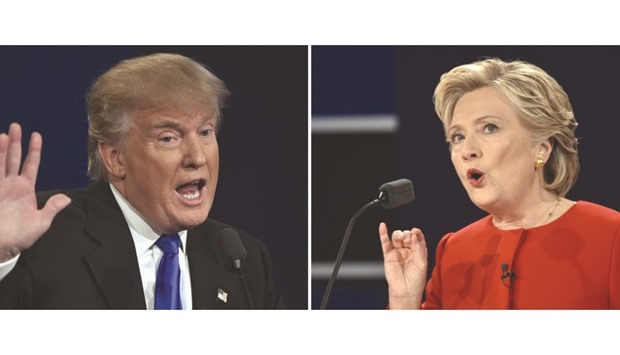A writer once wrote that a woman has to work “twice as hard to get half as far as a man” – then concluded, encouragingly, “fortunately this is not difficult”. Hillary Clinton worked at least twice as hard as Donald Trump to prepare for Monday’s presidential debate, since he apparently didn’t work at it at all. He even boasted as much in noting her absence from the campaign trail. She had the facts, the arguments and even the body language on her side.
“And you know what else I prepared for?” she quipped in response to Trump’s put down. “I prepared to be president.”
Trump may have thought he’s gotten this far in the race on his brand and by ridiculing opponents, so why start prepping now? The ancient Greeks would call it hubris. Some might call it the last gasp of the cliched entitled rich man who thinks someone else will carry his water.
He wasn’t just weak in his facts and lacking a strong central message. He also apparently hadn’t decided something the whole world was wondering about: which Donald Trump would show up? Would it be the cocky, combative plain speaker or the confident, well-mannered businessman?
Instead he lurched from gracious to insulting, reasoned to rambling. After threatening to bring former president Bill Clinton’s former lover Gennifer Flowers to the debate, Trump solicitously asked Hillary Clinton onstage if he should call her Secretary Clinton, noting, “I want you to be very happy. It’s very important to me.”
Being unprepared for a close-up is one thing. Trump’s bigger problem is not being prepared for an America in which women expect to be treated the same as men, no one wants to be body shamed, and minorities will soon outnumber native-born white people.
With no provocation on Monday, he hypothesised that whoever hacked DNC e-mails could be “somebody sitting on their bed that weighs 400 pounds”. Asked to comment on race relations, including excessive force by police against African-Americans, he pivoted to a call for law and order – implying it was on African-Americans to obey the law.
He struggled to answer Clinton’s criticisms of his baseless claims that America’s first black president wasn’t born in America. He was even forced to admit he settled a racial discrimination lawsuit with the federal government for not renting apartments to African-Americans.
You seldom hear Trump talk about a Muslim or immigrant who isn’t either a terrorist or here illegally. It would be one thing if he came from a place where there were few minorities, but any New Yorker regularly encounters scores of minority and foreign-born people – from cab drivers to newspaper vendors.
They’re law-abiding workers and business people who pay taxes, provide needed services and toil long hours to support their families. They are also entrepreneurs, titans in publishing, information technology, engineering and medicine.
But Trump apparently thinks he can win over voters who are hurting by sowing resentments against people of other backgrounds.
Let’s defer here to folk singer/songwriter James McMurtry in his poignant tribute to laid-off workers titled, We can’t make it here.
“Should I hate a people for the shade of their skin
Or the shape of their eyes or the shape I’m in
Should I hate em for having our jobs today
No I hate the men sent the jobs away.”
“Will I work for food, will I die for oil
Will I kill for power and to us the spoils
The billionaires get to pay less tax
The working poor get to fall through the cracks... ”
Besides criticising trade treaties like NAFTA and TPP – with some justification, including his criticism of Clinton’s changing positions – Trump offers little direction for those workers whose companies moved. Instead of passing tighter regulations to discourage out-migration by businesses, he wants to cut business taxes and have fewer regulations.
Instead of calling out the greed that motivates profit-hungry CEOs to seek ever-cheaper labour sources, Trump celebrates greed as a business value. When Clinton claimed he benefited from the housing crisis, hoping the bubble would collapse so he could buy cheap, he answered: “That’s called business, people.”
When she suggested he has paid no federal income taxes, to the detriment of many public institutions, he answered: “That makes me smart.”
Clinton slammed Trump for stiffing service people after they did work for him, including an architect she said was in the hall. Replied Trump: “Maybe he didn’t do a good job and I was unsatisfied with his work.” Pressed on declaring business bankruptcies multiple times, he said the laws allowed him to: “I take advantage of the laws of the nation because I’m running a company. My obligation right now is to do what’s best for myself, my company and my family.”
But if these self-serving motivations are the values Trump would bring to the White House, why does he even want to be in public service? And why would we elect him?
While Trump’s lack of preparedness didn’t serve him well, what spoke even louder was his attitude. What does it say to our sons and daughters about succeeding in life if the man who wants to be president feels above preparing? What is his message about fairness, initiative, hard work and responsibility? That that’s for women and minorities?
OK, then. It certainly gave Clinton a chance to shine.
* Rekha Basu is a columnist for the Des Moines Register. Readers may send her e-mail at [email protected]

Donald Trump and Hillary Clinton speaking during the first presidential debate at Hofstra University in Hempstead, New York on September 26.
